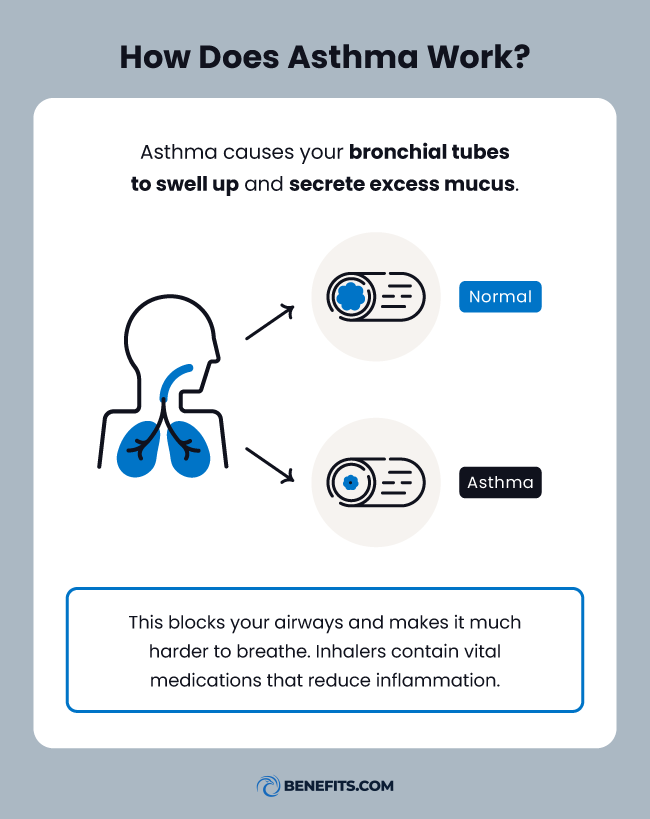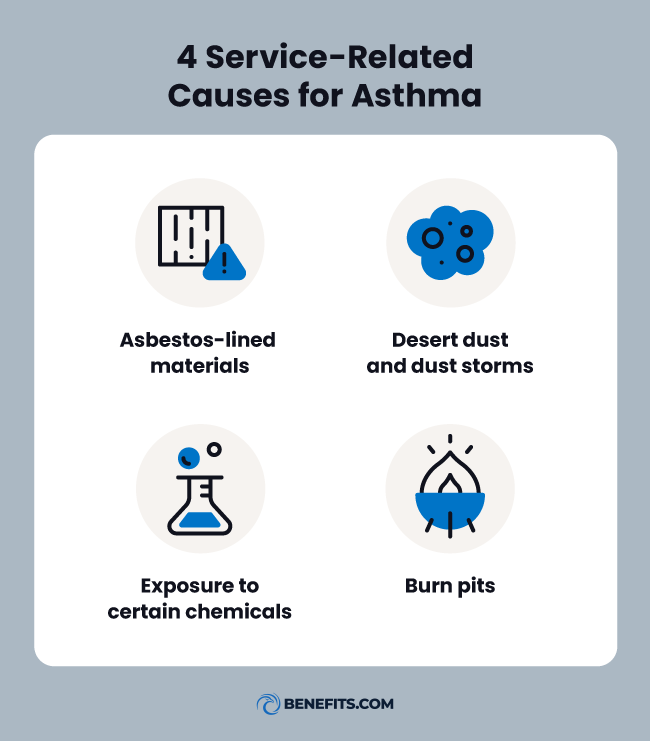Asthma is a chronic respiratory illness that affects more than 27 million Americans. If a veteran develops asthma, the Department of Veterans Affairs (VA) may offer disability benefits if there’s a connection between military service and the condition. Your asthma VA rating greatly influences your eligibility for benefits.
You can receive an asthma VA rating of 10%, 30%, 60%, or 100% based on your symptoms. We’ll explore each of these ratings, discuss several causes of asthma, and share resources to help you apply for VA benefits.
Is Asthma a Disability?
The VA considers asthma a disability under Diagnostic Code 6602 of the Federal Register. Asthma can be a severe condition that leads to shortness of breath, chest tightening, wheezing, and asthma attacks. An asthma attack can be life-threatening if it doesn’t improve with home treatment and continues to worsen.
Although many asthma cases are diagnosed in childhood, they sometimes don’t get diagnosed until adulthood. To diagnose asthma, your doctor will first go over your symptoms and medical history. Then, you may need to perform a lung function test to evaluate your breathing and confirm your condition.
Veterans can develop asthma or have their symptoms worsen due to military service. Exposure to burn pits, chemical agents, and excessive dust can adversely affect service members. Establishing a service connection between your military history and condition is pivotal to receiving benefits, particularly if you don’t qualify for a presumptive disability.
How Are Asthma VA Ratings Determined?
The VA rates asthma claims from 0% to 100% using the following information to determine the severity of your symptoms:
|
Rating |
Diagnostic Code 6602 |
|
10% |
Your asthma symptoms are manageable with occasional bronchodilator medication. |
|
30% |
Your symptoms require daily use of bronchodilator medicine. |
|
60% |
You must use immunosuppressive medications at least three times a year. |
|
100% |
You’re required to use high doses of steroidal medication each day. |
The VA also considers two metrics that evaluate your breathing: forced expiratory volume (FEV1) and forced vital capacity (FVC).
FEV1 measures how much air you can breathe out forcefully in one second, while FVC measures how much air you breathe out naturally after that second. Together, the two metrics give the VA a decent picture of your lung function.
For a 100% disability rating, you must either:
- Require daily corticosteroids or immunosuppressives
- Suffer from asthma attacks more than once per week
- Show an FEV1 or combined FEV1/FVC result of less than 40% of non-asthma sufferers
You can also qualify for a lower rating of 30% with an FEV1 or joint FEV1/FVC result of no more than 70% if:
- You require non-inflammatory medicine
- You need daily bronchodilator therapy
A veterans disability attorney can help you file your claim for asthma benefits. Your attorney might suggest you undergo an independent medical examination (IME) to strengthen your claim for VA disability compensation.
Common Secondary Conditions to Asthma
Asthma can cause other ailments to surface, which the VA considers secondary conditions. Common secondary conditions for asthma include:
- Acid reflux/GERD
- Heart disease
- Hypertension
- Rhinitis
- Sinusitis
- Sleep apnea
- Type 2 diabetes
Veterans who are unable to work may be eligible for Individual Unemployability benefits based on their symptoms. The 70/40 rule qualifies veterans in two scenarios:
- You have an asthma VA rating of at least 60%.
- You have multiple qualifying service-related disabilities that have a total disability rating of 70% when combined.
Why Do Military Veterans Develop Asthma?
Environmental triggers, like desert dust, burn pit exposure, and combustion are some of the major reasons why soldiers may develop asthma during or after their service. Asbestos exposure could also be a primary cause of active duty and veteran service members developing lung disease or aggravating bronchial asthma.
Although asbestos doesn’t cause asthma, it can lead to asthma attacks when it mixes with dust and other air fibers. Asbestos-containing materials have been used in the United States military for decades, leading to an increased exposure risk for military members.
What Is a Presumptive Disability?
A presumptive disability is a chronic medical condition that is presumed to be the result of a veteran’s military service. If you are filing a claim for a condition that is classified as a presumptive disability, the VA may not require additional documentation to establish a service connection.
For example, suppose you developed asthma two years after leaving service and were deployed to Iraq in 2006. In that case, the VA acknowledges that it is very likely that you developed asthma because of the toxic air you breathed while deployed to the region. The only proof you’ll need to provide is that you have been diagnosed with asthma and that you deployed to Iraq after August 2, 1990.
Who Is Eligible for Presumptive Asthma Disability Benefits?
To be eligible to claim asthma as a presumptive disability, you’ll need to verify the following information in your application:
- A current diagnosis of chronic asthma that developed within 10 years of leaving service
- Assignment to the Southwest Asia theater of operations or Somalia from August 2, 1990 to present or assignment to Afghanistan, Uzbekistan, Syria, Egypt, Jordan, Lebanon, Yemen, or Djibouti from September 11, 2001 to present
If you’re filing a claim for the first time, submit your application on VA Form 21-526EZ. You can file your claim online, through the mail, or in person at your regional VA office.
If you previously filed for asthma and were denied, you can reapply using VA Form 20-0995 under the new presumptive disability rules. No action is required for claims that are still pending.
Sources of Airborne Pollution
Many Gulf War and post-9/11 veterans have been exposed to airborne pollution. Some common forms of air pollution include:
- Smoke and fumes from burn pits
- Sand, dust, and other fine matter in the air
- General air pollution from gases, factories, emissions, etc.
- Smoke from oil well fires
- Exhaust from military aircraft, vehicles, and generators
Burn pits were used on military bases to get rid of waste, exposing service members to toxic fumes from burning hazardous materials. While this practice has stopped, researchers are still studying the long-term health effects on veterans.
If you were exposed to burn pits during your deployment, you are encouraged to complete the Airborne Hazards and Open Burn Pit Registry. This voluntary study gathers data from veterans who can give a first-hand account of conditions around military burn pits. Even those who aren’t experiencing symptoms now are encouraged to take the survey. Participants will also be alerted as new information about the long-term health effects of burn pit exposure becomes available.
11 Causes of Asthma Attacks
Biological, behavioral, and environmental factors can all increase a veteran’s likelihood of developing asthma. The following are some of the most common causes of asthma attacks that can range from mild to life-threatening.

1. Environmental Irritants
A wide range of environmental irritants can make even people without asthma experience respiratory difficulties, including:
- Tobacco smoke
- Burn pit or cooking smoke
- Dust
- Air pollution
- Asbestos exposure
- Cleaning chemicals
- Air fresheners and perfumes
These and other irritants mix with air particles, which people inhale. Those with asthma are more sensitive to these particles, so they could irritate your lungs easily and cause an asthmatic episode.
If you’re filing a VA claim for disability compensation, be sure to include every environmental irritant that causes an asthma attack, along with how frequently you encounter it.
2. Medications
For people with asthma, some medications can trigger an asthma attack as a side effect. Asthmatic adults may be sensitive to aspirin and other anti-inflammatory drugs. Some blood pressure and heart disease medications are also risky for people with asthma.
3. Weather
Cold, humid, hot, and hazy weather can all play a role in asthma attacks. Abnormal weather conditions can make it harder for asthmatics to breathe. Some also experience severe asthma attacks from thunderstorms.
Asthmatic adults who live in cities and areas prone to air pollution or extreme weather patterns might find that they’re more affected than others.
4. Physical Activity
You might aggravate your asthma symptoms with physical activity, or you might only experience asthma symptoms when completing physical activity. Exercise can exacerbate asthma when it narrows the airways to your lungs.
It can be challenging to qualify for VA benefits if you only have exercise-induced asthma because it doesn’t affect multiple aspects of your life.
5. Chemicals or Gases
Several chemicals and gases in the air you breathe can affect asthma and lead to asthma attacks. A common trigger for asthma attacks is household cleaners that contain chemical ingredients. Other causes include gases from cooking smoke, paint fumes, new furniture or carpeting smells, and carbon monoxide in closed garages with vehicles.
If your asthma symptoms are sensitive to chemicals and gases, you should consider switching to all-natural products that contain less harsh ingredients.
6. Gastrointestinal Conditions
Gastrointestinal conditions, like irritable bowel syndrome and acid reflux, sometimes coexist with asthma and can make symptoms worse. Gastrointestinal issues can induce asthma symptoms when stomach acid gets into the respiratory system.
When this happens, the lungs become aggravated, causing a chain reaction of symptoms that could ultimately lead to an asthma attack.
7. Respiratory Infections
Any respiratory infection can lead to a higher risk of asthma symptoms in people with asthma. These conditions include the flu, chronic bronchitis, and pneumonia, as well as other conditions that infect your lungs and airways.
Even a superficial infection like the common cold could lead to significant and even life-threatening symptoms for people with asthma.
8. Preservatives in Food and Drinks
Some preservatives and additives in food and drinks are known to exacerbate asthma symptoms. These preservatives might appear in canned foods, jarred foods, bottled drinks, dried fruits or vegetables, and some alcohol products.
Sulfites can be especially dangerous for asthmatics. These preservatives can cause shortness of breath, wheezing, or straining to catch your breath, leading to varying degrees of asthma attacks. Some familiar names of sulfites to look for include:
- Sodium bisulfite (found in dried fruits and jam)
- Sodium sulfite (found in cereal, dry potatoes, bread, and maple syrup)
- Sodium metabisulfite (found in sausages, burgers, and apple cider)
- Potassium bisulfite (found in gravy, pickled food, and soup)
- Potassium metabisulfite (found in wine, beer, and food preservatives)
9. Stress
People under a large amount of stress or those prone to anxiety could be at a higher risk for asthma attacks. Stress and anxiety can cause physical symptoms, like muscle tension and shortness of breath, that can make it difficult to breathe.
If you frequently notice increased asthma symptoms or asthma attacks due to stress or anxiety, it’s crucial to reduce overactivity in your sympathetic nervous system. Meditation or controlled breathing could be helpful in a high-stress situation.
10. Allergens
Both environmental and food allergies can cause asthma attacks. Particles from pet dander, dust mites, mold, pollen, and other particles in the air can aggravate the lungs of a person with asthma.
People at risk for anaphylaxis from specific food allergies could experience severe, life-threatening asthma attacks. Even without a severe food allergy that causes anaphylaxis, a person could experience more wheezing and shortness of breath when in contact with the food, leading to asthma symptoms.
11. Secondary Conditions
Some secondary conditions may exist with asthma, and they could trigger asthma attacks in some people. For example, obstructive sleep apnea is a condition that interrupts your sleep at night. It commonly exists with asthma and could lead to a higher risk of asthma attacks.
If your health care provider has diagnosed you with both conditions, make sure you include all medical evidence in your VA disability claim. You may be eligible to file a sleep apnea claim with a secondary service connection to receive a higher VA disability rating.

Learn More About Your Asthma VA Disability Eligibility With Benefits.com
Understanding your asthma VA rating can help you get the maximum benefits you’re entitled to. It’s also vital to follow every step of the process completely. This means filling out your application, gathering military documents, and completing any exams requested by the VA.
Take our Benefits Quiz to see what benefits you may qualify for.
Frequently Asked Questions
An asthma VA rating has a great deal of nuance to it, so it’s only natural if you have lingering questions. Here are answers to some of the most common questions we’ve encountered.
Why Was I Denied Asthma VA Disability?
On average, it takes the VA 151.2 days to approve or deny a claim. You can appeal a rejection, though you have 120 days after the decision is made to file an appeal.The main reasons why the VA denies applicants are:
- There was a lack of sufficient medical evidence.
- The applicant didn’t complete a VA exam.
- There wasn’t a clearly established service connection.
- The claimant missed important due dates or incorrectly filled out their application.
What Benefits Can Individuals With Asthma Qualify For?
Individuals with asthma who meet the eligibility criteria may qualify for various benefits. These can include Social Security Disability Insurance (SSDI) or Supplemental Security Income (SSI) if the condition prevents substantial gainful activity. Additionally, reasonable accommodations in the workplace may be available under the Americans with Disabilities Act (ADA), such as modified work schedules or environmental adjustments to reduce asthma triggers.
How Can I Prove My Asthma-Related Disability?
For individuals who aren’t eligible for presumptive disability benefits, submitting comprehensive medical documentation is crucial. This includes detailed reports from health care professionals, lung function tests, and documentation of medication usage, hospitalizations, or emergency room visits. Providing evidence of the limitations asthma imposes on daily activities and work performance is vital for substantiating a disability claim.
 Benefits.com Advisors
Benefits.com Advisors
With expertise spanning local, state, and federal benefit programs, our team is dedicated to guiding individuals towards the perfect program tailored to their unique circumstances.
Rise to the top with Peak Benefits!
Join our Peak Benefits Newsletter for the latest news, resources, and offers on all things government benefits.



















